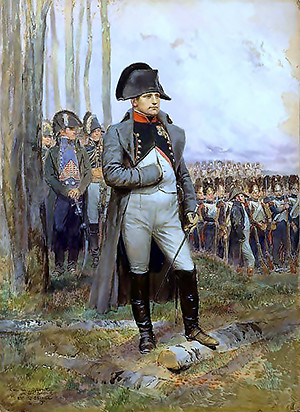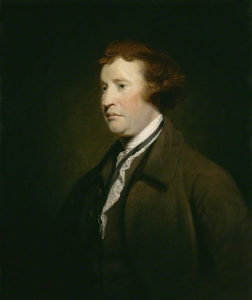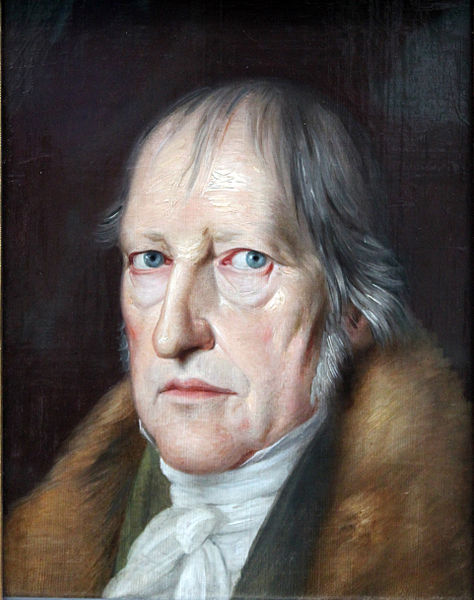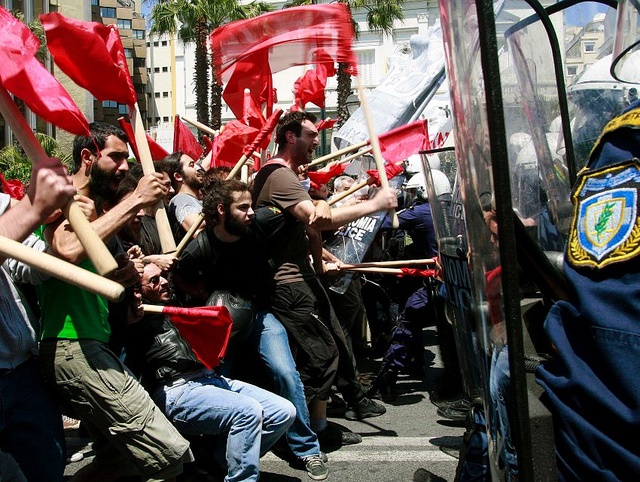
Louis A. Ruprecht Jr.
Edmund Burke (1729-1797) referred famously to “the consecrated state.” G.W.F Hegel (1770-1831) spoke of the modern democratic state almost as if it were a “temple” dedicated to human freedom. Both men came to their startlingly spiritual views of modern politics and the modern state by reflecting critically on the French Revolution and its aftermath.

The seesawing general outline of that revolution is well known. There were the initially moderate political reforms born of the new enunciation of “the Rights of Man” between 1789 and 1792. Then came the politics of the guillotine, initiated when Louis XVI and his family were executed on January 21, 1793, and resulting in a year-long Reign of Terror, when the revolutionaries essentially turned on themselves in the name of defending an ostensibly pure ideology. Then came the predictable reaction against the violent excesses of the Terror and its apparent evisceration of the very rights the Revolution was designed to protect, from 1794-1799. Then came the gradual centralization of political power by Napoleon, a general who had been responsible for the revolutionary Republics “defensive” wars in Italy and Egypt. He would eventually move on Paris, much like Roman generals of old, to take control of an increasingly disorganized and chaotic Revolution and to centralize political power under his imperial leadership.
What made Napoleon different from the emperors of old, and what made his wars different from the wars previous empires waged, was precisely the revolutionary idea of human rights that the Revolution had unleashed. Playing on Rousseau’s famous quip about the need to “force people to be free,” Napoleon intended to export the ideals of the Revolution through military conquest. Conquered territories, in theory, received radical legal reforms designed to implement the central values of the new regime: Liberty, Equality and Fraternity.
How liberty was to be promoted by conquest, how equality was to be defended by an emperor, and how fraternal fellow-feeling was to overcome the understandable national resentments of British or Prussian or Italian opponents to the French regime, was never very clearly explained. And so the period of the Napoleonic Wars commenced in earnest around 1800.

Burke worried eloquently about the dangerously destabilizing impact of that regicidal Revolution. He also felt that the rhetoric of this Revolution, unlike its North American counterpart, had become excessively anti-traditional as well as anti-monarchial. He countered the French Revolution in the name of “consecrated” European tradition.
Hegel took a more nuanced view of the Revolution and its long political aftermath. He thought the fundamental moral commitments of the French revolutionaries were laudable: an enunciation of political rights, a robust new concept of civil liberty, the radical idea of the equality of persons.
But the excesses of the Revolution were equally apparent to him. Chief among these was the Revolution’s aggressive secularism, a design of secular politics that was not intended to be neutral vis à vis religious belief, but actually hostile to it. To Hegel’s way of thinking, the Revolution had turned anti-religious, thus, it had run aground.
What makes Hegel’s reflections on the French Revolution so pertinent to political thinking today – and, I would like to suggest, relevant to an understanding of last Sunday’s election results in Greece – are the contemporary lessons he insisted should be taken away from Europe’s own history. I would like to highlight four of those lessons here.
The first is perhaps the easiest to miss. That is the idea that Europe had a distinctive history, and increasingly, a shared political and ethical identity. The French Revolution was, for Hegel, not a French event, but a world event, one which took place in a moment when the European gunpowder empires just so happened to be in a position to export their revolutionary ideas around the globe. He was fascinated, for instance, by the way the idea of the Rights of Man underwrote the first successful slave rebellion in the New World taking place in Haiti from 1801-1804.
Hegel concluded, the that French Revolution – all of it, including its unraveling–had contributed to making Europe European, and that future political debate would necessarily be held in terms set by the French Revolution. Nowhere is this clearer than in the unremitting confusion over the relation between religion and politics in a modern democratic state. This is Hegel’s second great insight: the need to interrogate the meaning of the term ‘secular’. Hegel discerned more clearly than most European observers that the aggressive secularism of the French Revolution prompted a reaction, generating an Early Modern version of the “culture wars” that we see alive and well in countries as diverse as the United States and Turkey, today.
The French Revolutionaries confiscated church properties, converted churches into secular monuments like the French Pantheon, offered blood sacrifices to “Reason” in storied French cathedrals like Notre Dame, looted the Vatican Museum and brought these “national treasures” to the Louvre, exiled the Roman Pope, subverted the Christian calendar, and started over with the Year One. Tellingly enough, from Hegel’s perspective, almost every one of those revolutionary moves was to be undone during the Revolution or immediately afterward. But the terms of modern political debate had been set: now the question of the appropriate place of religion was a permanent question; the answer could not be, and never would be, assumed. The European nations would now see this question as what it was: one of the perennial questions of modern politics.

Third, Hegel recognized that the old categories of liberal and conservative no longer applied to modern political arrangements. What was an emperor like Napoleon, after all? Both and neither, it would seem. In short, classical political terms needed to be re-imagined in the face of the radical new political realities the Revolution had unleashed. The very conception of liberty was to be altered, once it was connected to equality. Quite suddenly, the old liberal conception of liberty as freedom from interference (whether by individuals or by the state) was replaced by the classical republican conception of liberty as freedom from domination. The relationship between a master and a slave was to be the paradigm of a corrupt social and political arrangement. Freedom from domination, and abolition, constituted the new purpose of European politics.
This reference to classical thought raises the fourth and final implication of Hegel’s reflections on the French Revolution– namely, the relation of (ancient) Greece to (modern) Europe. As I noted above, Hegel understood that the ideals of the French Revolution were exportable. They were exported to the Caribbean, and they were to be exported to Greece.
The territory we think of as Greece today was a province of the Ottoman Empire during the French Revolution and the Napoleonic Wars. Hegel just so happened to offer his most influential lecture courses on World History in the same period when Greece undertook its long War of Independence from the Ottoman Empire (1821-1830), a war and a freedom that were won only with considerable European support. Greece won its independence in the Treaty of London, received a constitutional form from Britain, and a king from Bavaria, all in 1830; Hegel died quite suddenly the following winter.
In this way, Greece had been removed from the Ottoman orbit and brought into the European sphere. In Hegel’s terms, Greece was made an essential part of the emerging history and identity of Europe. And those terms have set the terms of political debate in Greece ever since.
Which brings me, at last, to the elections which took place in Greece last Sunday, and the debate they are sure to generate about the future, not just of the Austerity regime in Greece, but of the European Union itself.
Noting these continuities, in geopolitical terms, is a central aspect of looking at Europe in the Hegelian manner. During the period of the Napoleonic Wars, France and Germany duked it out for hegemony on the Continent, with Great Britain alternately observing from the sidelines and then intervening in those wars. That was true in 1812, it was true again in 1870, and it was true in both the First and Second World Wars.
It is true in the European Union, as well. In it but not of it, Britain’s place in this Union has been as unsettled in its own way as Greece’s is now. Britain is in the Union but not a member of the Euro-zone. Greece is a member of the Euro-zone, but is at best an uncertain member of the Union.
The European Union has essentially been attempting to be three things simultaneously since the Second World War and those three things can often work at cross purposes. It is an economic union, it is a political union, and it is a vaguely cultural union partly grounded in a Hegelian myth about Greece’s status as “the origin of Europe.”
It is my contention that Greece’s inclusion in the European Union served the cultural myth of European identity far better than it served the economic union which it joined in 1980. There is, as yet, no authentic political union to speak of in Europe.
When the Icelandic banking crisis was followed by the Wall Street crisis in Fall 2008, Greece’s economic woes soon followed. When the depth of the nation’s economic disease became apparent in 2009, a bailout package was negotiated with the so-called Troika of the International Monetary Fund, the European Central Bank and the European Union. Between 2010 and 2014, Greece received a sequenced series of payments amounting to a staggering 240 billion euros (Greece’s debt had risen to nearly 200% of its GDP by 2013).
The conditions placed upon Greece in order to receive these bailout payments were severe. The Austerity regime has crippled the country and the economy it was intended to save over the past five years. The numbers are staggering: reductions of pensions and payment for state employees by fifty percent, oppressive budget cuts that have crippled social services, resulting in the evisceration of the country’s university and health systems, 25% unemployment with youth rates in excess of 50%, a doubling of suicide rates (now the highest per capita in Europe), and so on.

In short, the fiction of a European Union has been replaced by blame and bailout. There is no economic union. There is no political union. There is no cultural unanimity. It is quite literally a Greek tragedy.
Greece’s reason for joining the economic union was access to cheap credit; that rationale no longer exists. The economic interests of the big economies of France and Germany was access to more open markets; that rationale persists. Greece’s reason for joining the political union was a matter of prestige as much as anything else: a rotating presidency of the European Union would periodically come to Greece, co-equal passports and open borders eased both travel and commerce, providing the Greek citizen with a new sense of prestige and power.
But Greece’s prestige and power are now at an all-time low. And the open borders within Europe have created a crisis of illegal immigration for Greece and southern Italy that is enormously costly in euros and in lives. Greece has the most coastline of any country in Europe, by an order of magnitude; it cannot afford to police the University of Athens, much less its coasts.
This, in brief, is why early elections were called last Sunday, as the means for an increasingly desperate electorate to express the limits of its tolerance for the current Austerity regime and a Troika that appears to take its orders from Berlin. All the original reasons for joining the Euro-zone are gone; new reasons have not been forthcoming.
Into that vacuum, a new political party, the left-leaning Syriza party, emerged quite recently… and won an overwhelming victory last Sunday night. Earning more than 36% of the popular vote, Syriza far outstripped the three main parties that had pretty well defined post-War Greek politics until now: the conservative New Democracy party, or ND (which received nearly 28% of the vote), the Democratic Socialist Party, or PASOK (which received just under 5%) and the National Communist Party, or KKE (which received roughly 5.5%). Another new Party born of the Austerity regime, the alarmingly neo-fascist Golden Dawn Party, distressingly came in third on Sunday night (with well over 6% of the popular vote), proving once again that voters embarrassed to admit how they are voting continue to vote for a violent anti-immigrant program that blends economic resentment with ethnic nationalism and alarming gestures to the Nazis.
(One other party, The River, received slightly more than 6% of the popular vote and will hold 17 seats in the Assembly; their perplexing platform involves “changing the country without bringing it down.” George Papandreiou’s new party gained less than 3% of the popular vote and no seats).
Syriza’s party leader, Alexis Tsipras, who was just sworn in as Greece’s youngest post-War Prime Minister (he is 40 years old), ran on the promise that his Party would get Greece out of this Austerity regime, and if necessary, out of the Euro-zone. As Syriza’s victory began to look more likely in recent weeks, Tsipras’s rhetoric became more muted. But the Greek people were voting on a revolution, and a revolutionary new approach to Crisis, Austerity and the future of the European Union.
The problem is that Syriza fell just short of the 151-seat majority it needed to control the 300-seat National Assembly (Syriza will hold 149 seats); they were thus immediately forced to form a coalition. They could not reasonably form a coalition with the traditional liberal and conservative parties (PASOK and ND, which hold 13 and 76 seats, respectively), since both parties remain committed to seeing the Austerity regime through to the end. And no one wants to form a coalition with the Golden Dawn. So the unexpected choices appeared to be these: work with the diminished communists of the KKE (who will hold 15 seats) or else with a relatively unknown right-leaning nationalist party, the Independent Greeks led by Panos Kommenos (receiving less than 5% of the vote, this Party will hold 13 seats in the new Assembly, the same number as PASOK).
Unpredictably, Syriza veered right, not left, and has formed a highly unstable coalition with those conservative nationalists who are not like the ethnic purists attracted to the Golden Dawn (which will hold 17 seats in the new Parliament). It is difficult to see what the Syriza and Independent Greek parties will agree to, beyond their common opposition to the current Austerity regime and their determination to toe a tough negotiating line with Angela Merkel.

Tsipras’s first two actions as Prime Minister were telling in this regard: on Monday, February 2, he visited the Kaisariani War Memorial, commemorating the killing of 200 Greek freedom fighters by the Nazis in 1944; and he elected to break with tradition so as not to be sworn in by the head of the Greek Orthodox Church, Archbishop Ieronymos. Tsipras is publicly atheist, and several prominent Orthodox monasteries were deeply implicated in the first revelations of the Greek government’s cooking its books.
A nod to the right and a nod to the left– a stab at Germany and a stab at Orthodox religion. It is the French Revolution all over again. Which brings us back to Hegel.
The European political order had attained a form, Hegel believed, that set the terms for future political debate for the foreseeable future. Recall the four lessons which Hegel took away from the new forms of Revolutionary and post-Napoleonic politics:
- Europe was now a unified entity, a union, whose destiny was not yet determined;
- The relationship between modern religion and modern politics was similarly indeterminate;
- The old labels of liberal and conservative no longer had salience or analytic value; and
- Greece lay somehow at the heart of all this.
Looking at the election, it is striking how prescient Hegel’s views now seem. The task for modern political arrangements is the avoidance of dominating relations between persons and states. Consecrated or no, the Greek state is about to embark on a very serious interrogation of what (if anything) liberty, equality and fraternity can mean in Europe today.
Louis A. Ruprecht Jr. is the William Suttles Chair in Religious Studies and an affiliate faculty member with the Hellenic Studies Center and the Center for Collaborative Scholarship in the Humanities at Georgia State University. His latest book is Winckelmann and the Vatican’s First Profane Museum, (Palgrave Macmillan, 2011).
